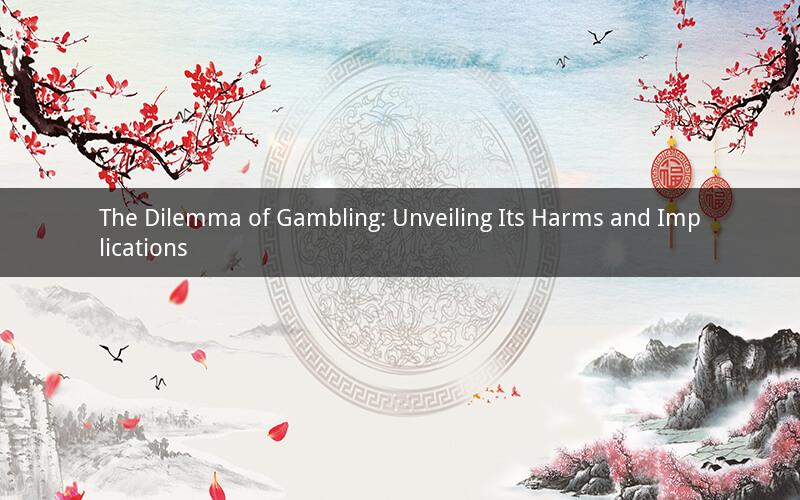
Gambling has been a topic of debate for centuries, with enthusiasts and critics alike presenting their perspectives. Is gambling inherently harmful? This question has been pondered by individuals, experts, and policymakers worldwide. This article delves into the multifaceted nature of gambling, exploring its potential harms and the broader implications it holds for society.
The allure of gambling lies in the thrill of taking risks and the possibility of winning big. From casinos to online platforms, people are drawn to the chance of winning money or experiencing the excitement of playing games of chance. However, the same elements that make gambling appealing also contribute to its potential harms.
One of the most significant concerns surrounding gambling is the risk of addiction. Compulsive gambling, also known as gambling disorder, is characterized by an inability to control the urge to gamble, despite negative consequences. This addiction can have severe repercussions on an individual's personal, financial, and professional life.
Financial problems are often the first sign of gambling addiction. People may spend excessive amounts of money on gambling activities, leading to debt, financial ruin, and even bankruptcy. This not only affects the individual but also has broader implications for their families and society as a whole.
The emotional and psychological impact of gambling addiction is also profound. Individuals with gambling problems may experience feelings of guilt, shame, and depression. Relationships may suffer, as gambling addiction can lead to neglect and abuse. In some cases, it can even result in self-harm or suicide.
In addition to addiction, gambling can also lead to other negative consequences. For instance, it can contribute to an increase in crime rates, as individuals desperate to repay their debts may turn to illegal activities. Moreover, gambling addiction can lead to neglect of other responsibilities, such as work and family, further exacerbating social problems.
The broader implications of gambling extend beyond the individual level. Gambling can have a significant impact on communities and economies. For example, the construction of casinos and gambling establishments can lead to increased employment and economic growth. However, this growth often comes at a cost, such as the potential for increased crime, addiction, and social issues.
In recent years, efforts have been made to address the harms associated with gambling. Many countries have implemented regulations and policies to promote responsible gambling and protect individuals from the potential dangers. These measures include setting age limits, imposing betting limits, and providing support for those struggling with gambling addiction.
While these measures are commendable, they may not be sufficient to address the underlying issues. Educating the public about the potential harms of gambling, promoting awareness, and fostering a culture of responsible gambling are essential steps towards mitigating the risks.
1. Question: What are the signs of gambling addiction?
Answer: Signs of gambling addiction include an inability to control the urge to gamble, preoccupation with gambling, neglecting responsibilities, borrowing money to finance gambling, and experiencing emotional and psychological distress due to gambling.
2. Question: How can gambling addiction be treated?
Answer: Treatment for gambling addiction can involve various approaches, including cognitive-behavioral therapy, self-help groups, support from family and friends, and in some cases, medication. The specific treatment plan depends on the individual's needs and severity of addiction.
3. Question: Can gambling addiction be prevented?
Answer: Preventing gambling addiction involves a combination of measures, including promoting responsible gambling practices, educating the public about the potential harms, and implementing regulations to protect individuals from the risks. Early intervention and support for at-risk individuals can also be effective.
4. Question: How does gambling addiction affect families?
Answer: Gambling addiction can have devastating effects on families, including strained relationships, financial problems, emotional distress, and in some cases, domestic violence. It is crucial for families to seek support and resources to cope with the challenges posed by gambling addiction.
5. Question: Are there any benefits to gambling?
Answer: While gambling has its potential harms, it can also offer some benefits. For instance, gambling can provide entertainment, a sense of excitement, and opportunities for social interaction. Moreover, gambling can generate revenue for governments, which can be used for public services and infrastructure projects.
In conclusion, the question of whether gambling is harmful is a complex one. While it can provide excitement and entertainment, the potential for addiction and its associated harms cannot be ignored. By promoting responsible gambling practices, addressing the root causes of gambling addiction, and providing support for those affected, society can strive to minimize the negative implications of gambling and maximize its benefits.